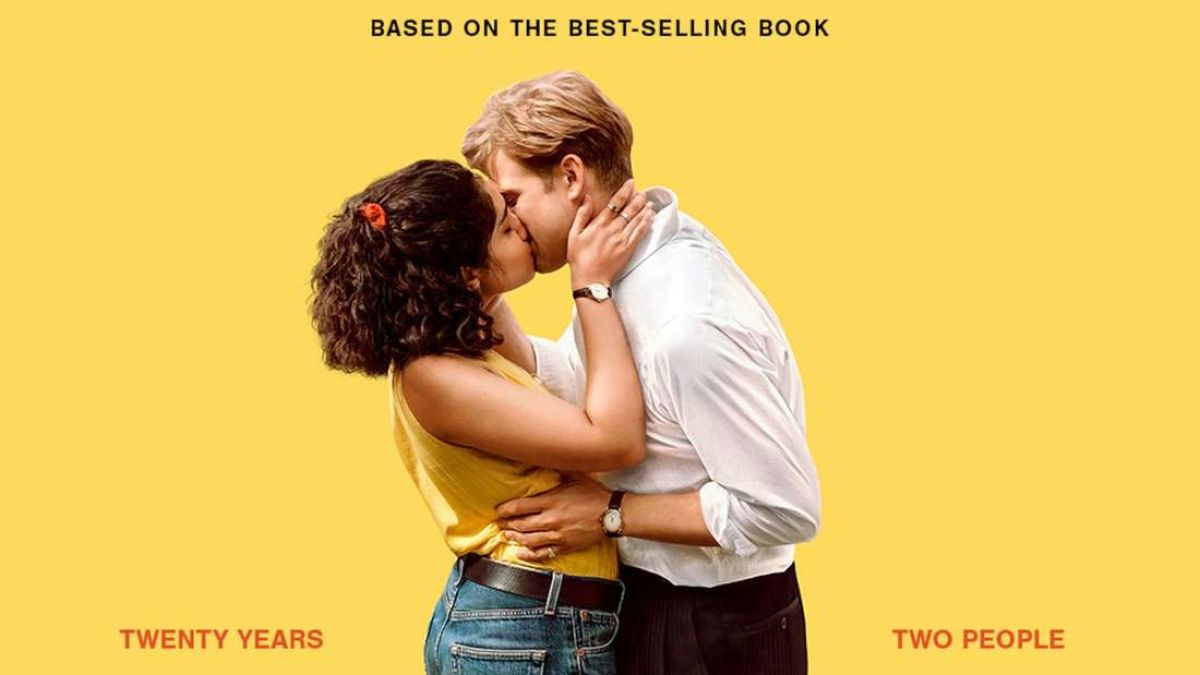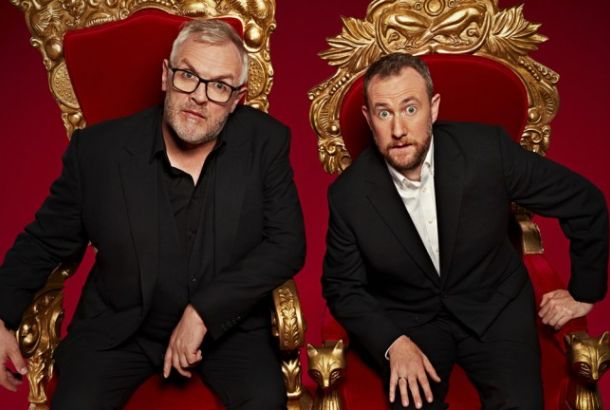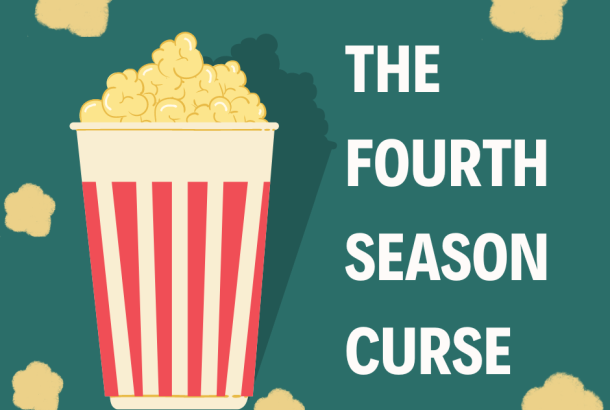How does Netflix’s One Day compare to the original novel and feature film?
By Eleanor Duke

It’s been 15 years since David Nicholls published his novel One Day, Netflix released its 14-episode adaptation of the much-beloved romance, following the protagonists Emma Morley and Dexter Mayhew, portrayed by Ambika Mod (This is Going to Hurt) and Leo Woodall (The White Lotus). Much like the novel, the series follows Emma and Dexter’s 20-year-long friendship, checking in each year on July 15, St. Swithun’s Day – the anniversary of their first encounter back in 1988. Controversially, though, Netflix’s adaptation ends on a significantly different note to the original novel.
This article contains spoilers.
Amassing over 15 million views in its first 11 days and topping the Netflix charts, the 2024 One Day limited series has been likened to the BBC adaptation of Normal People which graced our screens during the pandemic, shooting Paul Mescal and Daisy Edgar-Jones into the stratosphere of Hollywood fame. And, rightly so – the One Day limited series is almost perfect. Unlike the 2011 film adaptation starring Anne Hathaway and Jim Sturgess, the new Netflix release perfectly realises Nicholls’ portrayal of tender and difficult young relationships without losing Emma’s humour and Dexter’s coyness that made his original novel so enjoyable.
This begs the question, what did Netflix’s adaption do better – or, perhaps more so, where did the 2011 adaptation fall short? And how loyal did both adaptations stay to the original plot of Nicholls’ tear-jerking novel, One Day?
The Ending
Perhaps quite controversially, the biggest difference between the adaptations and the One Day original novel is the ending. I hate to sink the Emma and Dexter ship, but the original novel actually ends with Dexter in a new relationship – with Maddy, with whom he works at the café.
Like at the end of the film and in the final episode of the One Day adaptations, Dexter and his daughter still climb Arthur’s Seat together, and there are still those heart-wrenching flashbacks to 1988. But, unlike in the series, the trip to Edinburgh in 2007 is taken with Maddy and Jasmine in the novel, not Jasmine and Dexter’s Dad.
For those who read the book first, this might seem like heresy. As a huge Harry Potter fan (I am not a JK Rowling fan), I was always furious when slight changes to the original world were made for the screen. But, in the case of One Day, I think the changed ending works incredibly well. Bringing in a new relationship in the final episode would have been hard to achieve; it would have felt rushed and Maddy’s character would feel somewhat underdeveloped.
Leaving Maddy out of the adaptations keeps the focus on Dexter and Emma’s relationship. Maybe it’s just the idealist in me, but I like to see it as proof that they were right for each other and, to be honest, the limited series hurt enough without Dexter moving on.
The Casting
One of the greatest triumphs of the new limited series has to be the casting; Mod and Woodall shine in their roles of the lovable but complicated protagonists, with Mod, in particular, putting Hathaway’s 2011 sub-par performance to shame.
A fundamental part of Emma’s character is her unconventional and understated beauty – something that she only comes to appreciate as she ages and progresses, of course. Hathaway was hard to believe in this role – a pair of thick-rimmed glasses and clumsy haircuts didn’t take away from her Hollywood glamour, and instead made her a caricature of a typically awkward, shy, and nerdy 20-something, which minimised the nuanced nature of Emma’s character and instead transformed the beautifully complicated One Day into somewhat of an ‘Ugly Duckling’ romcom.
Hathaway has been long criticised for her abysmal Leeds accent (rightly so), and Mod has spoken openly in interviews about how she herself struggled to grasp Emma’s Yorkshire drawl. Working with a dialect coach, Mod thankfully pulled it out of the bag, rendering her Emma much more realistic, and less like a confused, globetrotting American caught between an exaggerated cockney, vaguely northern, and at times New Yorker accent. Upon rewatching the 2011 adaptation, Hathaway’s accent was so painful I actually had to skip through some scenes (she won’t mind me saying this, her net worth is $80 million).
One of the biggest casting differences is also that Emma is no longer white but, worry not, this isn’t a ‘Dumbledore is actually gay’ moment. Emma’s ethnicity is never explicitly mentioned in the original novel. I’m sure there are some people out there who will suggest that it is wokeism gone mad.
I honestly think that this casting change is something that should be celebrated; a woman of colour in a leading romance role in which she is not totally defined by stereotype is something we really should be seeing more of. Whilst she isn’t defined by her racial identity, Emma’s heritage doesn’t go unspoken, either; it is not as though director Molly Manners has tried to just slip it under the carpet. It simply adds another layer to the onion that is Emma.
This isn’t to say that Lone Scherfig’s 2011 adaptation got it completely wrong with the casting; Jim Sturgess makes a remarkable Dexter, capturing his warmth and internal struggles with great sensitivity and depth. Hathaway and Sturgess show signs of real connection in the film, and, let’s be real, we’re all rooting for them the whole way through.
The chemistry between Mod and Woodall, though, is unmatched and oozing throughout all of their scenes, no doubt thanks to the number of Intimacy Coordinators on set. As the two finally cross the line from 20-year friendship to romance, a raw and honest depiction of a long and trusting but turbulent love is abundantly clear (not that I would know what that feels like), making One Day all the more believable.
The Structure
The structures of the book, film, and series, are all unsurprisingly very similar due to the nature of the story; the flashbacks and settings remain relatively loyal to the original novel.
The series lends itself to the structure of the novel better, however, as the 14 episodes allow the audience greater insight into the experiences of Dexter and Emma, as well as the supporting characters like the painfully unfunny Ian (Emma’s boyfriend) and Tilly (Emma’s best friend). In the film, a lot of the background feels like it’s painted in blurry, impressionist-style strokes, whereas the series offers greater precision that enhances Emma and Dexter’s universe, including their friendships and experiences at work.
The series creates a world, rather than rushing through to all of the more dramatic moments like the film seems to do. In this sense, I think that the series really does do the original novel justice, as it is at its heart a novel about a changing and developing friendship – it isn’t a melodrama or a romcom, it is a reflection of life.
With Nicholls’ involvement in the writing of both the series and film, it’s no surprise that neither adaptations lose the sarcastic tone of the original Emma Morley or the infuriating but charming nature of Dexter Mayhew. Nicholls’ fantastic narrative voice seeps through every crack of each scene, both in the film and the series.
Despite this, though, it is the series format that has made Netflix’s new adaptation of One Day so much more poignant and enjoyable; the storyline isn’t rushed, and each character feels truly three-dimensional. Or, perhaps, it is simply the wise decision that a major Hollywood star should not be cast as an unconventionally attractive 20-something aspiring writer from Leeds. Topped with an eye-wateringly good soundtrack, the series does One Day far greater justice than the film ever could.







